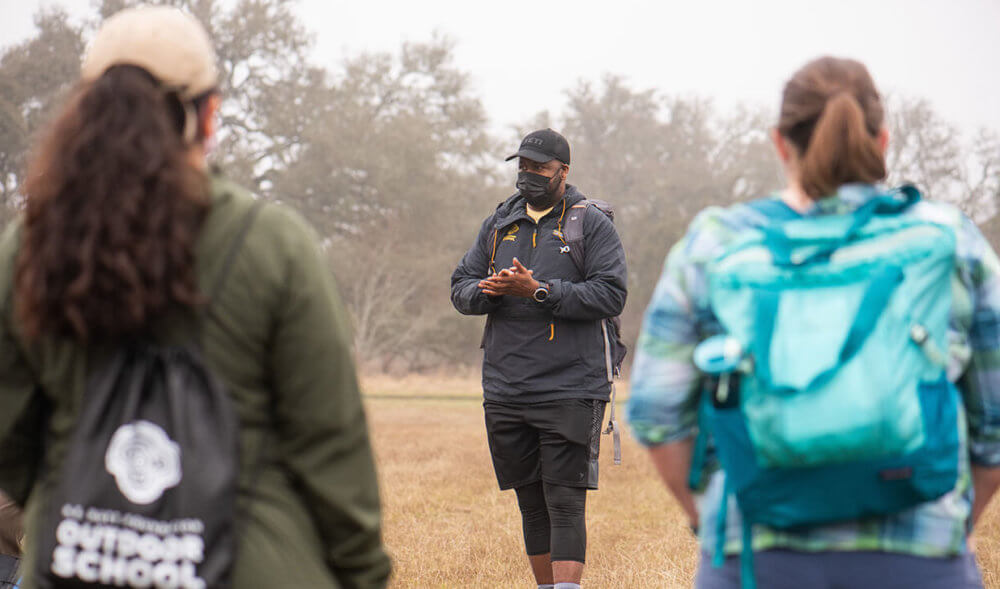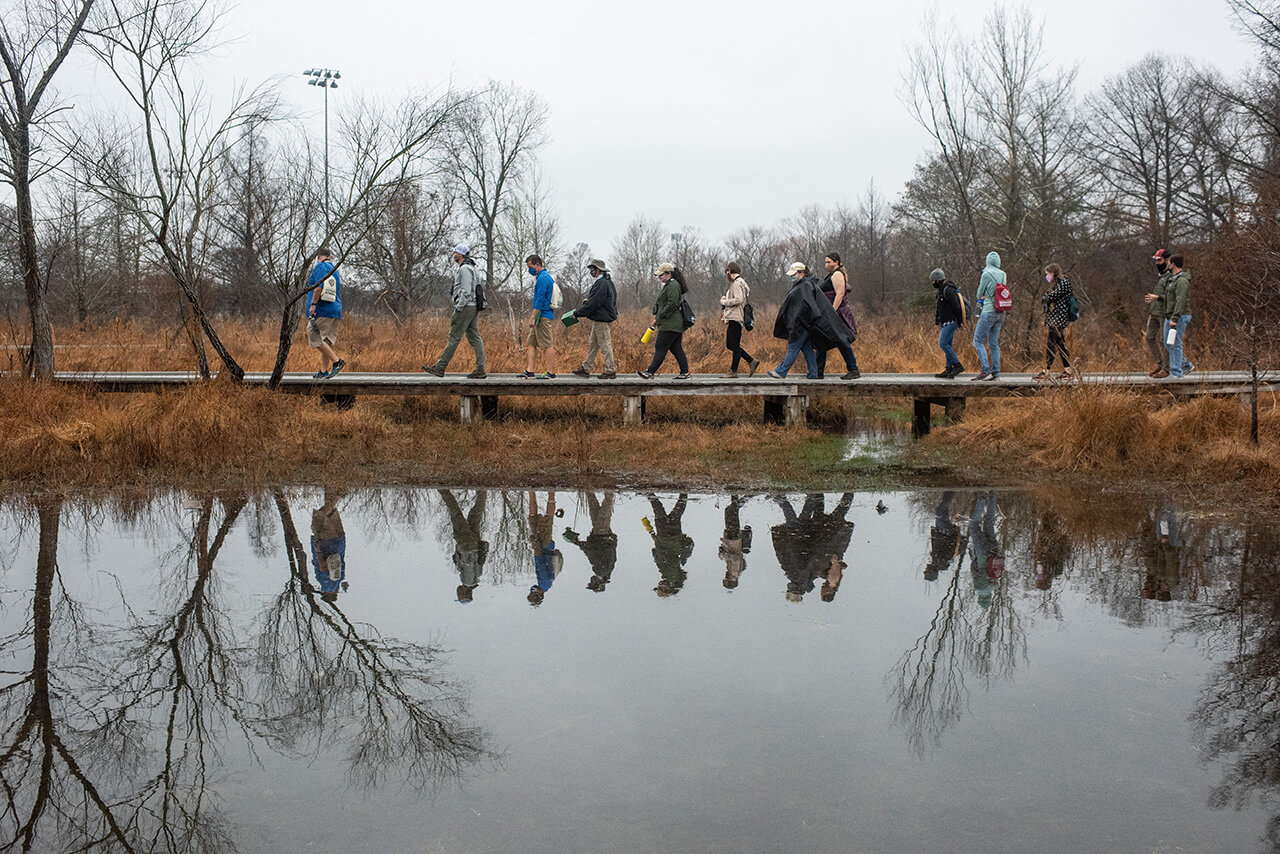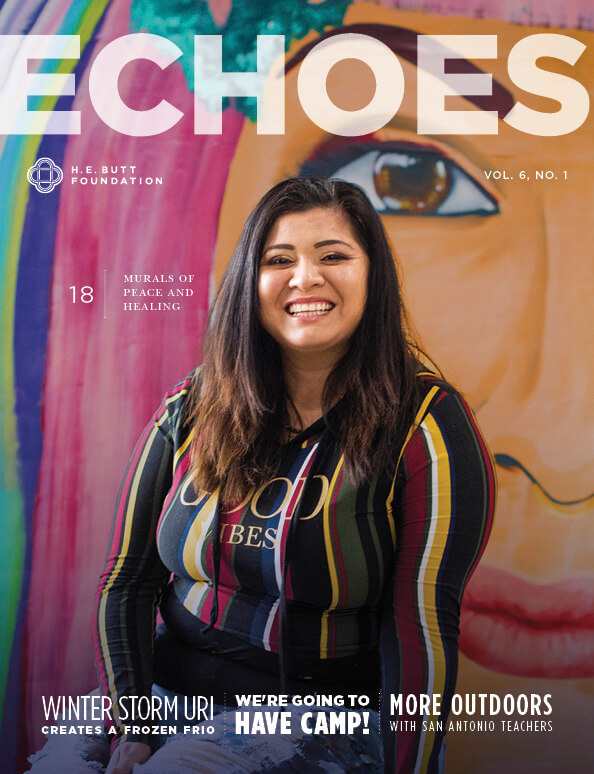
Archery targets lean against the wall. Snacks and gift bags and free t-shirts await on a picnic table. Through the mist, a hiking trail beckons.
Even though it’s 7:45 am on a Saturday in February 2021, Alex Bailey, the senior director of Outdoor School, couldn’t be more excited. He joined the Foundation shortly before the COVID pandemic, and this day marks his first in-person event with teachers.
“Now I feel official,” he says, laughing, “one year later.”
Soon ten San Antonio ISD teachers join him here at the Herff Farm garden barn where drizzle and fog covers everything in a wet, otherworldly gray. Outdoor School staff from the H. E. Butt Foundation and from the The Cibolo Center for Conservation in Boerne, Texas, meet the teachers outside the Queen Bee’s office for a temperature check and COVID questionnaire.
This event is a milestone for the H. E. Butt Foundation, launching the first More Outdoors Cohort, a three-year program designed to help school communities regularly incorporate outdoor education.
Meeting at The Cibolo, rather than the H. E. Butt Foundation Camp, is another milestone. These schools and teachers will eventually get out to the Canyon, likely once a year for the next three years. But Bailey hopes to bring Outdoor School as close to their communities as possible. He dreams of the day when students on the East Side or West Side would get excited about the natural areas available to them even in their own downtown neighborhoods.
Margaret Lamar, executive director of The Cibolo and self-described “Texas ranch girl,” is an eager partner, and her vision matches Bailey’s.
“Experiences on our own campus,” she says, referencing 950 acres of farm and park on Cibolo Creek, “are catalysts to help guests have a relationship with nature in their communities.”

The day is filled with sample activities. Teachers dip nets in the creek and collect diverse samples from small colorful hoops placed in tall grass. They hike. They breathe deep. Bailey even challenges them to fifteen minutes of silent reflection. “Our prompt today is pretty simple,” he says. “’Nature is…’”
The gentle rain doesn’t discourage the teachers, who grab spots under trees or on various porches around Herff Farm to put in their reflection time.
Then they share. “Just being in nature. It grounds you,” says one.
“Vermillion Fly Catchers are out today. Pretty special,” says another.
“Nature is not retaliatory,” reflects a third. “If I spit on the ground, the ground doesn’t say, ‘Hey, don’t do that.’ It just continues to be a place where things grow.”
The teachers even acknowledge the privilege of their position in comparison to many of the students and families they serve. Some people don’t have the capacity to care about getting out in nature because they are struggling to put food on the table, says Laurie Brown, director of outdoor education for The Cibolo. “A place like this helps them drop off their outside stuff and be present.”
The teachers are quick to discuss other places that can provide the same sense of grounding and peace closer to their communities. They want to avoid the myth that nature and parks are the only wild places.
In a side conversation, Bailey points out to several teachers that Texas students spend more time in the classroom than students from any other state—by several hundred hours. Kids need to get out, he says.
Less than a week later, one of the teachers, Sarah Hudson, organizes a simple field trip for the entire sixth grade class at the Advanced Learning Academy on the campus of Fox Tech. Nestled in the heart of downtown, around the corner from the main branch of the Library, Fox Tech is the oldest public high school in San Antonio, founded in 1879.
The Riverwalk is practically across the street.
“I’ve been to the Riverwalk before, but I’ve never been on the boats,” one student remarks.
The students take pictures, collect trash, collect samples, and wander outdoors for the entire morning—more than three miles by the time they return to the classroom, according to one fitness tracker.
How would a school change as a community if outdoor education became a part of every student’s experience? What would be awakened?
As the students walk down a flight of stairs to the river, one of them observes, “We’re a sixth-grade army.”
